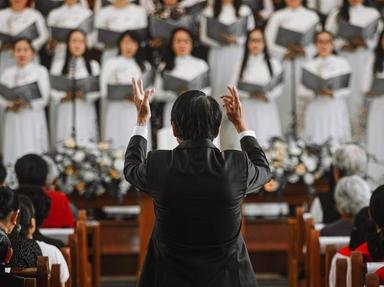Quiz Answer Key and Fun Facts
1. Henry Jackson Van Dyke served as U.S. ambassador to the Netherlands and Luxenberg, wrote more than twenty five books and is credited with writing six hymns with the most famous being 'Joyful, Joyful, We Adore Thee'. What are the missing words in the first line of his famous hymn?
"Joyful, joyful, we adore Thee, ____________, Lord of love;"
2. John Q. Adams, the sixth president of the United States, wrote the hymn 'The Hour Glass'. What was his middle name?
3. William Ewart Gladstone served as prime minister of his country on four different occasions and wrote the hymn 'O Lead My Blindness By the Hand'. Of what country did he serve as prime minister?
4. Noted poet and essayist Ralph Waldo Emerson wrote the hymn 'We Love the Venerable House'. Emerson was born in a city known as Bean Town. What city was he born in?
5. Nobel prize winner Emily Greene Balch wrote the hymn 'Now Let Us All Arise and Sing'. In what category did Balch, an American, win her Nobel Prize in 1946?
6. William Bradford, (1589 to 1657), was a colonial governor and wrote the hymn 'And Truly It Is a Most Glorious Thing'. What British colony was he governor of?
7. Gustavus Adolphus was the king of a European nation from 1611 to 1632 and is credited in some circles as being the writer of the hymn 'Fear Not, O Little Flock'. Of what country was he king?
8. Christopher Christian Cox, 1816-1882, was a politician who wrote the hymn 'Silently the Shades of Evening'. He graduated from an American college known as Old Eli. What is the name of the college?
9. Sarah Flower Adams, 1805-1848, was an actress and poet in England and is credited with writing a highly popular hymn. The first two lines of the second verse are as follows:
"Though like the wanderer, the sun gone down,
Darkness be over me, my rest a stone."
What is the name of the hymn?
10. 'Unto the Hills', was written by John George Edward Henry Douglas Sutherland Campbell (1845-1914). He was Governor General of Canada, serving from 1878 to 1883, representing the British monarchy. What monarch did he represent?
Source: Author
Cowrofl
This quiz was reviewed by FunTrivia editor
agony before going online.
Any errors found in FunTrivia content are routinely corrected through our feedback system.

